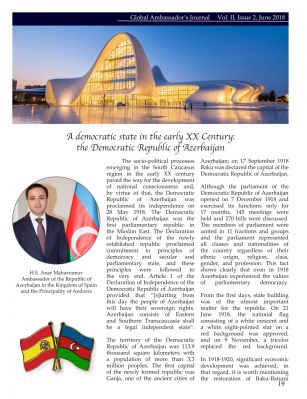Global Ambassador`s Journal has published an article by Ambassador of the Republic of Azerbaijan to the Kingdom of Spain and the Principality of Andorra, Permanent Representative of Azerbaijan to the World Tourism Organization Anar Maharramov headlined “A democratic state in the early XX century: the Democratic Republic of Azerbaijan”.
AZERTAC presents the full text of the article.
“The socio-political processes emerging in the South Caucasus region in the early XX century paved the way for the development of national consciousness and, by virtue of that the Democratic Republic of Azerbaijan was proclaimed its independence on 28 May 1918. The Democratic Republic of Azerbaijan was the first parliamentary republic in the Muslim East. The Declaration of Independence of the newly established republic proclaimed commitment to principles of democracy and secular and parliamentary state, and these principles were followed to the very end. Article 1 of the Declaration of Independence of the Democratic Republic of Azerbaijan provided that “[s]tarting from this day the people of Azerbaijan will have their sovereign rights. Azerbaijan consists of Eastern and Southern Transcaucasia shall be a legal independent state”.
The territory of the Democratic Republic of Azerbaijan was 113,9 thousand square kilometres with a population of more than 3,3 million peoples. The first capital of the newly formed republic was Ganja, one of the ancient cities of Azerbaijan; on 17 September 1918 Baku was declared the capital of the Democratic Republic of Azerbaijan.
Although the parliament of the Democratic Republic of Azerbaijan opened on 7 December 1918 and exercised its functions only for 17 months, 145 meetings were held and 270 bills were discussed. The members of parliament were united in 11 fractions and groups and the parliament represented all classes and nationalities of the country regardless of their ethnic origin, religion, class, gender and profession. This fact shows clearly that even in 1918 Azerbaijan experienced the values of parliamentary democracy.
From the first days, state building was of the utmost important matter for the republic. On 21 June 1918, the national flag consisting of a white crescent and a white eight-pointed star on a red background was approved, and on 9 November, a tricolour replaced the red background.
In 1918-1920, significant economic development was achieved, in that regard it is worth to mention the restoration of Baku-Batumi oil pipeline, the continuation of construction of Baku-Julfa railway, the creation of the Azerbaijan State Bank, the issuance of currency banknotes and the measures aimed at developing the Caspian Shipping Company.
Remarkable development was achieved in cultural and educational fields as well. The print media of the republic promoted the socio-political goals of the Democratic Republic of Azerbaijan as well as economic and cultural life of the country in a censorship free environment. On 1 September 1919, the parliament adopted the law on the opening of Baku State University, which later would be known as a leading educational institution in the region and became the centre of thought and national thinking. It was also planned to send young people to study in abroad, and in the 1919-1920 academic year, a resolution was adopted to send 100 young people to foreign universities for higher education at public expense.
As a one of the first democratic countries in the world and the very first majority-Muslim nation, the Democratic Republic of Azerbaijan granted women equal political rights with men, i.e. the right to vote much earlier than a great number of countries.
During its existence, the Democratic Republic of Azerbaijan had diplomatic relations with a number of states; agreements on the principles of mutual relations were signed with some of them; 16 states established their missions in Baku.
In order to achieve the admission to the League of Nations, on 28 December 1918, the Government of the Democratic Republic of Azerbaijan formed the delegation at the Paris Peace Conference headed by the speaker of parliament, Alimardan bay Topchubashov. As a result of the efforts made by the delegation and because of growing threat of occupation of Transcaucasia by Soviet Russia, the Supreme Council of the Allied Powers at the Paris Peace Conference de facto recognised on 12 January 1920 the independence of the Democratic Republic of Azerbaijan.
With the recognition of the Democratic Republic of Azerbaijan, the diplomatic ties of the democratic republic were expanded. Insofar as, a number of states, i.e. the United Kingdom, France, Italy, Belgium, Greece, Denmark, Sweden, Switzerland, Finland, Poland, Lithuania, the United States, Ukraine, Georgia, Armenia, Persia (Iran) established their missions in Baku. The Parliament of the Democratic Republic of Azerbaijan adopted a law on the establishment of diplomatic missions in the United Kingdom, France, Italy, Germany, Switzerland, Poland, the United States and Russia.
Suffice it to say, the invasion of the Democratic Republic of Azerbaijan by Soviet Russia could not foreclose the survival of the national identity, statehood, democratic principles and universal values in Azerbaijan. In 1991, when the Republic of Azerbaijan restored its independency, declared its loyalty to the traditions of the Democratic Republic of Azerbaijan. 28 May was officially declared the Republic Day in Azerbaijan.
Regard shall be had to the fact that the progress achieved in all fields in Azerbaijan, after the return of Heydar Aliyev - the builder of an independent Azerbaijan and the national leader, to the governance of Azerbaijan, has paved the way for prosperity of the country, advance the achievement of the Democratic Republic of Azerbaijan and has made Azerbaijan the leading country of the region.
During the presidency of Ilham Aliyev, who successfully continued the political course of national leader Heydar Aliyev, Azerbaijan made unprecedented strides in all areas of socio-economic sphere and gained great influence on the international scene.
The victory of Ilham Aliyev at presidential election of April 11, 2018, gaining the vast majority of the votes (86.2%), once again proves that the Azerbaijani people voted for stability, security, development and progress.
With the order of the President of the Republic of Azerbaijan, the year of 2018 was declared the Year of the Democratic Republic of Azerbaijan. As the President, H.E. Ilham Aliyev emphasized “Azerbaijan is one of those countries that has declared not only the most democratic values a hundred years ago, but also provided them with its practical activity”.
It gives rise to the obvious conclusion that the period of 1918-1920 is one of the glorious pages in the statehood history of Azerbaijan and will always inspire the Republic of Azerbaijan to maintain its independence, sovereignty, territorial integrity and democratic values.”
© İstifadə edilərkən "Xalq qəzeti"nə istinad olunmalıdır.




















